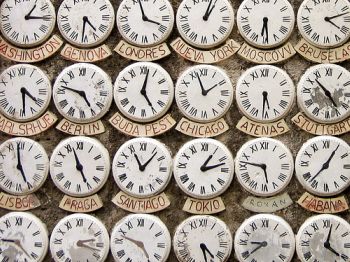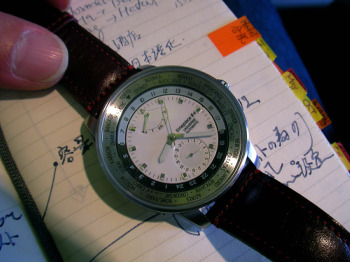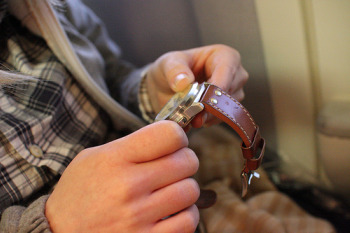‘Dinner at 7?’ asks my colleague. Beneath us, the Superfast Ferry eases into the Ionian Sea from its Mediterranean berth.
‘Greek time or Italian?’ I query. ‘Or are you being insufferably obdurate, and remaining on UK time?’
I wonder if it is only British people who choose not to adjust their watches when travelling.
 London – or nearby Greenwich, to be specific – is, indubitably, the hub of time. It is the prime meridian, the spot at zero degrees longitude where East quite literally meets West. So perhaps the British obsession with the time at home is understandable.
London – or nearby Greenwich, to be specific – is, indubitably, the hub of time. It is the prime meridian, the spot at zero degrees longitude where East quite literally meets West. So perhaps the British obsession with the time at home is understandable.
As we steam towards the Adriatic Sea this evening, from Patras to Ancona, I drain the dregs of Chianti and attempt to set my alarm clock. But, simply put, I’m not sure what the time is. What is time anyway?
Well, it is inextricably linked to longitude, for a start.
Charting the world’s longitude was no mean feat. We can now stand anywhere in the world – whether atop Mount Kilimanjaro or floating above the Geographical North Pole – and know our coordinates within a fraction of an inch. Although, at the North Pole it can be any time you would like – it is every time, all at the same time! In fact, you could very reasonably have breakfast, lunch or dinner there, or all one after the other for that matter. Time ceases to exist at this northerly latitude.
Eighteenth century mariners may have cared little for the hour as they plied the world’s oceans, yet they misjudged landfalls as regularly as clockwork. Myriad maritime disasters dogged the finest of admirals; without accurate longitude – and therefore time – risks were high. Nowadays, of course, we take GPS and time zones for granted. We know the exact time in New York, Paris and Singapore, yet modern day travel is not without its time-associated problems.
 Early explorers could never have dreamed of jetlag, though Vasco da Gama and Captain Cook – to choose two infamous pioneers at random – travelled far more of the world than most of us have today. Sailing within temperate zones – with clear distinctions between daylight and darkness – offered a regular sleep pattern, at least among the officers.
Early explorers could never have dreamed of jetlag, though Vasco da Gama and Captain Cook – to choose two infamous pioneers at random – travelled far more of the world than most of us have today. Sailing within temperate zones – with clear distinctions between daylight and darkness – offered a regular sleep pattern, at least among the officers.
Nowadays, with electricity and air travel, are we totally out of kilter? Darkness no longer necessitates sleep: we have artificial light and unnatural working hours. And we’re advised to sleep at “normal” times in the places that we arrive, no matter how many hours spent sitting uncomfortably on an aeroplane. Our bodies tell us it is midnight, yet our wristwatches read mid-afternoon. The man to blame is John Harrison, that lone genius who grappled with the thorniest scientific problem of his time – that of longitude.
Harrison’s ingenuity and craftsmanship changed world travel forever. A carpenter-cum-clockmaker, he solved the enigma of longitude, creating an accurate timepiece to withstand the stormiest of seas. By always knowing the time in London, coupled with skilled navigation, sailors now had a reliable means for establishing their whereabouts. Thus longitude was grasped, and world time established.
The West is now obsessed with time – if you are reading this, do you have one eye on the clock in the bottom right-hand corner? Maybe you have coffee at 11, or lunch at 12.30 on the dot? Let me ask this: are we more content than the rice-paddy farmer in Laos? He functions perfectly well without the need for a watch: when it is dawn, he must toil the fields; as dusk descends, he stows his hoe and rests. Clocks around the world, changing back and forth twice a year, make no impact on this timeless way of life.
 But for the rest of us, an hour forward or back can cause bedlam. You’ve just missed that train to Philadelphia, or that bus to Boston left fifty-five minutes ago. And that’s just within the same time zone! Throw in international travel, and time issues can become farcical.
But for the rest of us, an hour forward or back can cause bedlam. You’ve just missed that train to Philadelphia, or that bus to Boston left fifty-five minutes ago. And that’s just within the same time zone! Throw in international travel, and time issues can become farcical.
‘Italian time,’ replies my colleague, circumspectly. ‘The ship is on Italian time.’
I rewind my watch an hour behind Greek time, turn out the light, and pretend it is midnight instead of 11pm. Mentally, this helps me to sleep.
Maybe when I return home, I will try a day without looking at a clock even once. Could you? Try eating when you’re hungry and sleeping when you’re tired. Somebody, somewhere in the world will be doing the same thing.
photos, top to bottom, by: leoplus, taiyofj, arvindgrover